By Jennifer Goode | STC Senior Member; Bremen R. Vance | STC Member; Erica M. Stone | STC Member
A preliminary review of technical writing, user experience, instructional design, and content strategy job ads
As faculty preparing young professionals for jobs in fields related to technical communication (tech comm), we are involved in a broad study of the language in job ads. This article represents our preliminary analysis of tech comm job ads in the fields of technical writing, user experience, instructional design, and content strategy.
We believe this research will be useful for our students, for other educators, for job seekers, and for hiring professionals. The initial results we are presenting will be of interest to anyone who is curious about how their skillset aligns with the current market demands. This study aims to support our students’ professional development, while systematically validating current job market trends.
This article is an opening to a longer conversation and an invitation to readers to (1) contribute to our research design by asking questions that can be integrated in this ongoing study, and (2) engage in conversation with us about the nature of job ads and the knowledge they can provide about what our field values. A link to a reader survey is provided at the end of the article.
Mapping the Market
To develop a data set as part of our larger research interests, we have been collecting specific categories of tech comm job ads from Indeed.com each month. Using broad search terms, we have collected the results into data subsets based on the date of the search and the search terms. During the first week of the month, we identified and collected job ads by searching Indeed using the target search phrases. We repeated the search using the same search terms for the 10 most populous cities in the United States according to the U.S. Census: New York, Los Angeles, Chicago, Houston, Phoenix, Philadelphia, San Antonio, San Diego, Dallas, and San Jose. We removed duplicated postings from each subset that had been identified across locations. Table 1 describes four of the subsets from September 2021 that we have analyzed as part of a pilot study.
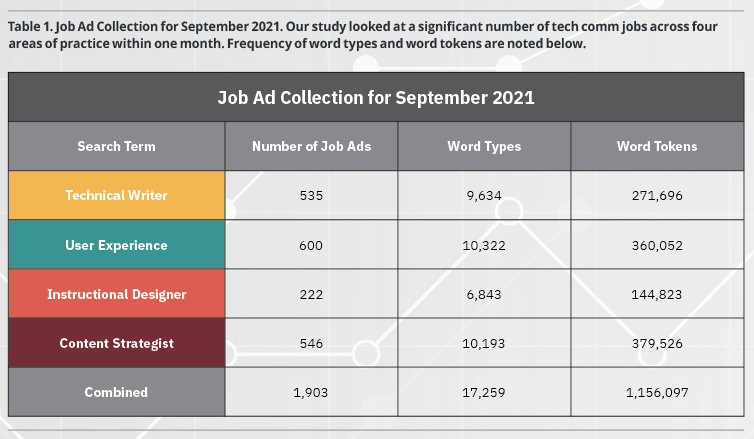
To identify trends in these job ads, we have applied a variety of methods. For now, we are sharing the results of our frequency analysis, which measures how often a word appears in the text. This type of analysis counts word forms (each unique word) and word tokens (each appearance of a word). In this article, when we refer to a word frequency, we are referencing the number of word tokens. After counting the words, we reviewed the frequency lists for a better understanding of what words were occurring most often across each subset. We expect this analysis to help us identify skills and applications that are significant for organizations hiring and for professionals looking for opportunities.
Where the Job Ads Agree
Word searches from the four job listing areas revealed interesting data that may inform understandings of current job listings. While these findings are preliminary and cannot be generalized, they are worth noting — both for early reflection and further investigation as the study continues. In our cursory review, we separated frequently occuring words into three sections:
- Relevant and Frequent Words: The most frequent words that appear in all four of the tech comm fields
- Desirable Tools and Technologies: The most commonly mentioned tools and technologies used to accomplish tech comm work
- Applicant Materials and Expectations: Common applicant characteristics and requirements for working in the four tech comm fields
Relevant and frequent words
Based on our initial analysis of 1,903 job ads across 10 cities, an analysis of the four categories together revealed an insightful list of most commonly occurring words: technical writing, user experience, instructional design, and content strategy. Figure 1 illustrates which search terms appeared across all four search terms (e.g., “experience”). It also demonstrates how some search terms are more likely to appear in one field but not in others. For example, “product” appears in ads for technical writer and user experience but not instructional designer or content strategist.
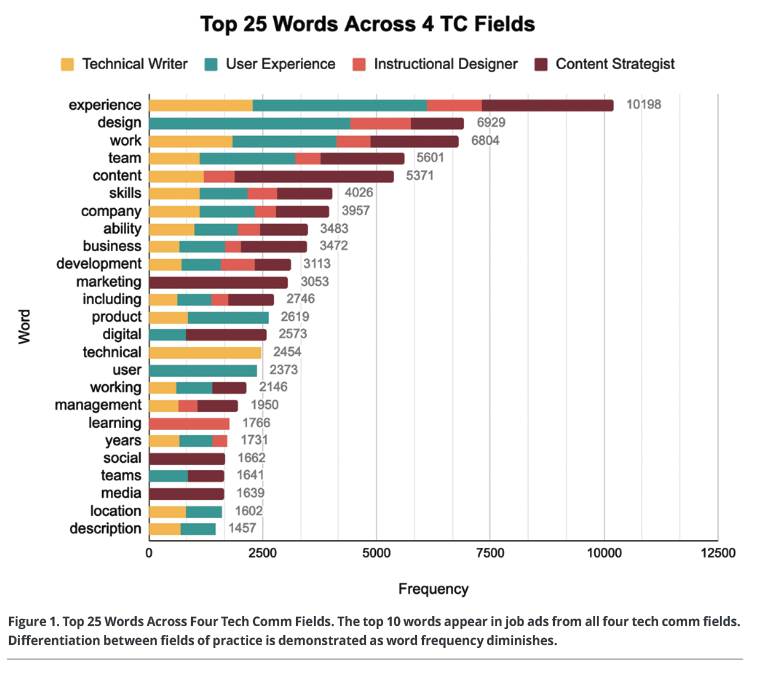
Teams and groups (and their many derivatives and applications) were frequently mentioned in all job listing types. The overwhelming mentions of team-related words (e.g., team, teams, teamwork, team-building, etc.) suggests that tech comm practitioners are viewed as highly collaborative workers inside their own departments and across organizations.
The most significant four words across all search terms (“content,” “development,” “design,” and “team”) are representative of core work in the tech comm field. Other high-frequency words were more generic and broadly applicable outside of tech comm.
Desirable tools and technologies
While our preliminary results have a narrow focus, they give us insight about which applications are commonly expected across roles and an overall picture of commonalities and differences between roles in tech comm areas.
For example, we know that the field relies heavily on Microsoft Office and Adobe Creative Suite products, across all job types. Figure 2 describes how eight common applications are required in job ads for technical writers, user experience (UX) designers, instructional designers, and content strategists.
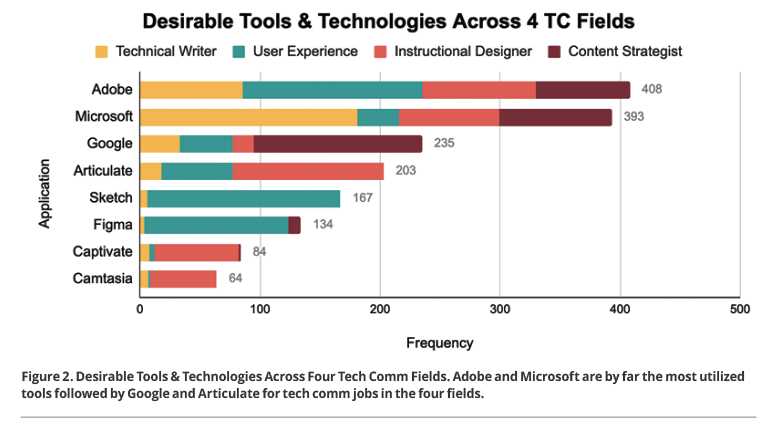
Technical writers are being asked to have familiarity with Microsoft Office products, especially Word and Excel, but also Teams, Sharepoint, and PowerPoint. Content strategy had a higher amount of social media application mentions, which is likely a reflection of the way content strategy is defined as a marketing role. Instructional designers are often asked to know Articulate (Storyline and Rise), LMS systems, and Captivate.[1] Usability practitioners were also asked for Figma and WordPress experience. Google and Adobe were mentioned often across all four job types; secondary analysis of these terms would likely reveal the relative importance of specific Google and Adobe products for each role.
Applicant materials and expectations
One of the most common characteristics of a job ad is the request for documents. Our preliminary results provide information about how many times the job ads in our data set requested a portfolio, résumé, or cover letter. Table 2 reports the number of job ads mentioning “portfolio,” “résumé,” or “cover letter” at least once.
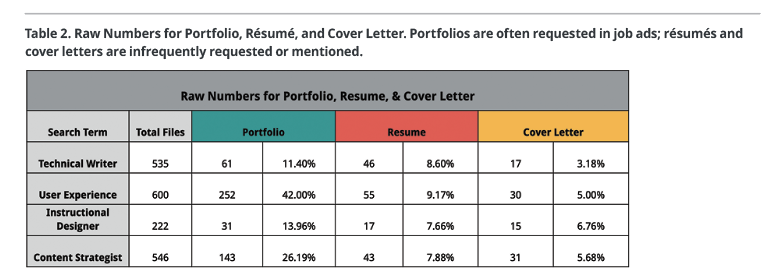
Drawing on the raw numbers, Figure 3 offers a visualization of how each tech comm field values portfolios, résumés, and cover letters. Here, we assume a higher frequency of requests for a particular document indicates a higher value for that particular field. An absence of a request for these documents doesn’t mean they shouldn’t be submitted during the job application process, especially in the case of portfolios.

“Portfolio” was mentioned more than “résumé” in every data set, indicating a possible emphasis on representative work samples over one-page work and education summaries.[2] While the research team noted some instances of work descriptions discussing managing a “portfolio” (not as a job application requirement). Portfolio appears nearly twice as often as résumé in the job ads for each category. Is it possible the résumé is gradually being replaced by the portfolio in the job search? Further analysis of portfolio requirements against the amount of experience expected may yield a better understanding of the expectations for these roles.
Formal education is still a hallmark of tech comm job requirements. Bachelor’s degrees were most mentioned across all four careers, with master’s degrees also frequently mentioned. Doctoral degrees, while infrequent, were mentioned in all categories of job listings, but were mentioned more frequently in UX and ID listings, perhaps because of stronger reliance in those fields on data and measurement.
Analytical and critical thinking capacities and skills appeared often, but were least mentioned in job ads for technical writing. The ability to critically analyze the context of content, learning, and user experience remains important in the field. It appears job ads do not fully reflect the creativity and complexity of technical writing work.
Interestingly, “security clearance” seems relevant in some job posting types, but not in others. The term was mentioned for 12 UX jobs and 19 tech writing jobs; however, there were no mentions in instructional design or content strategy postings. The emphasis on security clearance proves the continued importance for tech comm work — especially tech writing and usability work — in classified, government areas.
“Remote” was represented in all four searches, as was the word “location” (See Figure 1). After COVID-19 disrupted regular on-site office operations for nearly two years, many companies have realized that remote work is not only possible for their work, but sometimes more favorable in recruiting talent from a wider pool of applicants. Remote jobs are available and very visible in the latest job searches of all four professional areas. As we continue to develop and expand our study, we plan to focus on this aspect of the field and ongoing job market trends.
Implications and Suggestions
While the implications for our ongoing research project are limited at this time, a couple of implications and suggestions for job seekers, employers, students, and educators are present in the data.
Job Seekers:
- Develop a portfolio as well as a résumé. Many tech comm jobs require one.
- Prioritize proficiency in applications that are prevalent across tech comm fields.
Employers:
- Compose job ads that request a portfolio in addition to a résumé to get a better sense of what applicants can offer.
- Offer opportunities for remote work to attract a wider range of qualified applicants and continue the benefits of hybrid/remote work that we gained during the pandemic.
Students:
- Enroll in courses that develop critical thinking skills and practice working in teams.
- Gain experience with applications that are common across tech comm fields (e.g., Adobe, Microsoft, Google).
Educators:
- Design courses that give students the opportunity to develop critical thinking skills and teamwork.
- Provide students with opportunities to experience with applications that are common across tech comm fields (e.g., Adobe, Microsoft, Google).
Limitations and Call to Action
Our data set isn’t representative of the entire tech comm field; this pilot study is in its early stages, and we recognize its limitations:
- The study is only a snapshot of 1,903 job ads collected during September 2021.
- Our foci and search terms are reflective of the areas we teach.
- The definitions and descriptions of each tech comm area might differ by region or organizational context.
- We are still working to better understand how the Indeed algorithms function, how they impact job searching patterns, and how they evolve over time.
We invite you to contribute to our larger study by suggesting search terms and providing suggestions for the scope and focus of our larger study. If you have suggestions or questions for us, please share them in this feedback form:
https://www.tinyurl.com/TPCjobstudy
 JENNIFER GOODE, PhD, CPTC (jennifer@anypso.com) is a senior STC member and adjunct professor of technical communication at Mercer University in Macon, GA. With over 20 years of professional experience in government, non-profits, and for-profits, she also consults in the areas of instructional design and strategic human capital performance, measurement, and improvement.
JENNIFER GOODE, PhD, CPTC (jennifer@anypso.com) is a senior STC member and adjunct professor of technical communication at Mercer University in Macon, GA. With over 20 years of professional experience in government, non-profits, and for-profits, she also consults in the areas of instructional design and strategic human capital performance, measurement, and improvement.
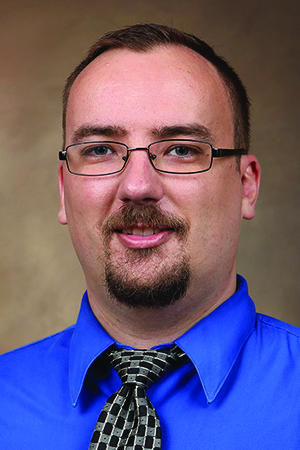 BREMEN R. VANCE, PhD (vance_br@mercer.edu) is a member of STC and an assistant professor at Mercer University. He teaches technical communication, content strategy, web design, and user experience courses. In his research, he studies the intersection of digital technologies and writing instruction using data-driven approaches for the analysis of texts through corpus-linguistic methods and content analysis.
BREMEN R. VANCE, PhD (vance_br@mercer.edu) is a member of STC and an assistant professor at Mercer University. He teaches technical communication, content strategy, web design, and user experience courses. In his research, he studies the intersection of digital technologies and writing instruction using data-driven approaches for the analysis of texts through corpus-linguistic methods and content analysis.
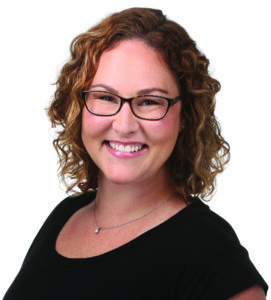 ERICA M. STONE, PhD (Erica.Stone@mtsu.edu) is a member of STC and the East Tennessee chapter of STC; she also serves on the STC Scholarship committee. Erica is an assistant professor of English and the associate director of general education English at Middle Tennessee State University where she teaches undergraduate and graduate courses in technical writing, public rhetoric, and first-year composition. Erica’s research is situated at the intersection of technical communication, public rhetoric, and community organizing.
ERICA M. STONE, PhD (Erica.Stone@mtsu.edu) is a member of STC and the East Tennessee chapter of STC; she also serves on the STC Scholarship committee. Erica is an assistant professor of English and the associate director of general education English at Middle Tennessee State University where she teaches undergraduate and graduate courses in technical writing, public rhetoric, and first-year composition. Erica’s research is situated at the intersection of technical communication, public rhetoric, and community organizing.


